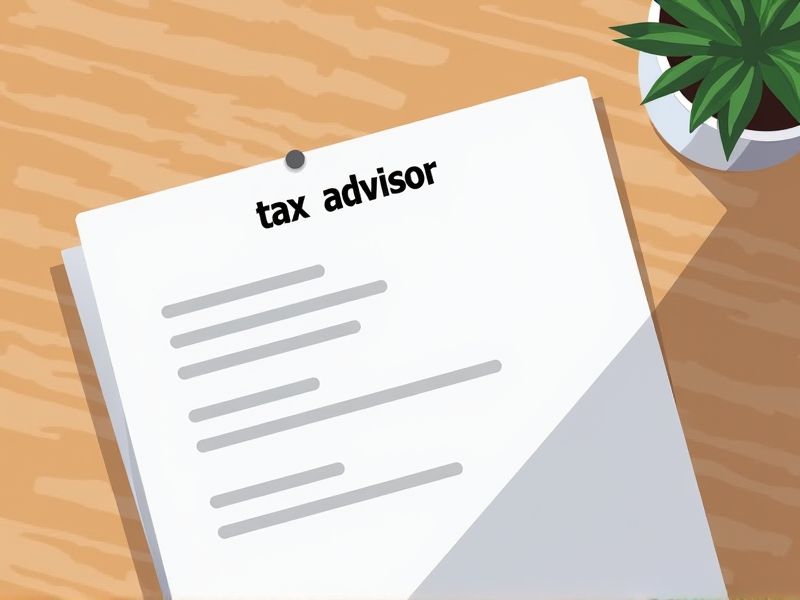
Tax advisors play a crucial role in ensuring compliance with tax regulations and optimizing clients' financial outcomes. Certifications equip tax advisors with specialized knowledge and skills essential for navigating complex tax laws. These credentials also enhance credibility, leading to increased trust and client confidence. Important certifications you may need as a tax advisor include CPA, EA, and CMA.
Certified Public Accountant (CPA)
The CPA designation ensures that a tax advisor possesses a comprehensive understanding of tax laws and regulations, which reduces the risk of errors in tax filings. CPAs are equipped to offer valuable insights that can lead to significant tax savings for individuals and businesses. Their ethical standards and commitment to continuing education ensure up-to-date and reliable guidance. The legal credibility of a CPA can provide increased trust and confidence for clients seeking expert tax advice.
Enrolled Agent (EA)
Tax codes are complex and frequently changing, making it necessary for advisors to have specialized knowledge. Enrolled Agents (EAs) possess the technical expertise and are federally authorized by the IRS, ensuring comprehensive understanding of tax laws. Their ability to represent taxpayers before the IRS provides clients with assurance and protection during tax audits or disputes. EAs are required to complete ongoing education, maintaining up-to-date skills and knowledge essential for accurate tax advising.
Chartered Tax Adviser (CTA)
Chartered Tax Advisers (CTAs) possess a comprehensive understanding of tax laws, enabling them to navigate complex tax codes for individuals and businesses effectively. Their qualification ensures they are up-to-date with the latest tax regulations, reducing the risk of financial penalties due to non-compliance. Clients benefit from their strategic tax planning advice, which can lead to significant savings and optimized financial outcomes. The expertise of a CTA instills confidence in clients by ensuring their financial matters align with legal requirements and best industry practices.
Accredited Tax Preparer (ATP)
Accredited Tax Preparers possess specialized knowledge which enhances the accuracy and efficiency of tax planning and filing processes. Their credential signifies a reliable standard of expertise, fostering trust among clients who seek assistance with complex tax matters. Businesses benefit from their skills in maximizing eligible deductions, leading to potentially reduced tax liabilities. The demand for ATPs arises from the evolving tax laws, where staying updated becomes crucial for offering accurate advice.
Certified Financial Planner (CFP)
Certified Financial Planners (CFPs) possess comprehensive knowledge in financial planning, which includes tax strategies, thereby enhancing their value in tax advisory roles. Their expertise in financial regulations and market trends allows them to provide more holistic advice, covering various financial goals alongside tax implications. By integrating financial planning with tax advice, CFPs help clients optimize tax efficiency while ensuring alignment with long-term financial objectives. The CFP certification ensures adherence to rigorous ethical standards, building client trust and ensuring reliable tax-related decisions.
Certified Fraud Examiner (CFE)
Tax advisors frequently encounter complex financial scenarios where irregularities can arise. A Certified Fraud Examiner (CFE) brings specialized skills in fraud detection and prevention, enhancing the advisor's ability to identify suspicious activities. The presence of a CFE can mitigate risks by ensuring compliance with regulations, thus protecting clients and their assets. Clients gain increased trust in tax advisors with CFEs, knowing there's an expert specifically equipped to handle potential fraudulent issues.
Chartered Accountant (CA)
Chartered Accountants possess deep knowledge of tax laws, ensuring accurate compliance and minimizing legal risks. Their expertise in financial analysis allows them to strategize optimal tax-saving opportunities. CAs stay updated with tax policy changes, providing informed advice that aligns with current regulations. Their experience in audit and financial reporting offers a comprehensive perspective, enhancing reliable tax decision-making.
Certified Management Accountant (CMA)
A Certified Management Accountant (CMA) has a deep understanding of financial planning and analysis, often essential for tax advisors to create effective tax strategies. The rigorous CMA curriculum enhances decision-making skills, which can lead to more accurate and strategic tax advice. With expertise in management accounting, a CMA can help optimize a company's tax position, impacting overall financial health. The certification often instills a strong ethical framework, crucial for maintaining client trust and compliance in tax advising.
Certified Tax Specialist (CTS)
Certified Tax Specialists bring an advanced understanding of tax laws, which enhances the accuracy of tax advice for clients. Their specialized training ensures they stay updated on complex and changing tax regulations, which reduces the risk of compliance issues. Obtaining CTS certification also signals a commitment to professional development, which can strengthen client trust. With their expertise, they can identify and leverage tax-saving opportunities, improving financial outcomes for individuals and businesses.
Tax Law Certification (TLC)
Tax Law Certification enhances a tax advisor's credibility by demonstrating specialized knowledge in an increasingly complex field. Obtaining this certification often leads to better client trust and more robust professional networks. Certified advisors tend to be more updated on legal changes, which can help in crafting precise tax strategies. This specialized training can result in improved career opportunities and potential earning capacity.
Summary
When you engage a tax advisor with certifications, you gain access to enhanced expertise and updated knowledge on tax laws. This often leads to more accurate and effective tax planning, minimizing your tax liability. Certified advisors are often trusted more, thus you'll likely feel more at ease and confident in the financial decisions made. You may also benefit from improved strategies that take advantage of the latest tax credits and deductions.
